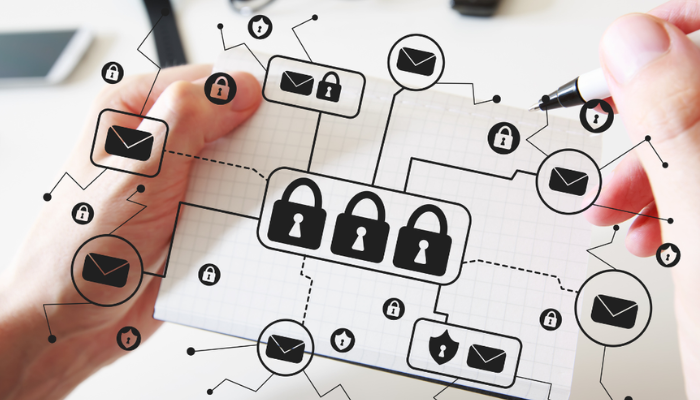Emails that comply with HIPAA Compliant Email are used by healthcare providers to store a substantial quantity of sensitive patient information. As a result, the privacy of this information is an extremely important concern. The Health Insurance Portability and Accountability Act (HIPAA) was created to provide national standards for the security of sensitive patient information, including the protection of such information when it is sent by email. Because of the proliferation of instant messaging applications like WhatsApp, healthcare professionals may be curious about whether or not these apps provide a feasible replacement for HIPAA Compliant Email. This article will compare HIPAA compliant email and WhatsApp alternative, examining their differences as well as the pros and cons of each service, with the goal of assisting healthcare practitioners in selecting the appropriate solution for their communication requirements.
Email That Is Compliant With HIPAA
Email that complies with HIPAA standards has been constructed in such a HIPAA Compliant Email way as to fulfill the prerequisites outlined in the HIPAA laws. This particular sort of email is both encrypted and secure, therefore guaranteeing that critical patient information is kept private. Email that complies with HIPAA regulations is very necessary for healthcare practitioners that need to share patient information with other healthcare professionals, insurance companies, or patients themselves.
Advantages of Using Email That Is HIPAA Compliant Email
Protects Sensitive Patient Information Encrypted email makes use of encryption and other security measures to safeguard sensitive patient information while it is being sent. This helps to guarantee that the information in question will continue to be kept private and safe.
- Improves Communication: HIPAA Compliant Email makes it possible for healthcare practitioners to share patient information in a timely and effective manner, which ultimately improves communication between patients, insurance companies, and healthcare providers.
- Compliance with HIPAA Laws is Maintained Using email that is HIPAA compliant guarantees that healthcare providers are in compliance with HIPAA regulations, hence lowering the chance of incurring expensive fines and taking legal action.
- Productivity is increased as a result of the fact that healthcare practitioners are now able to convey patient information in a rapid and effective manner through email, which in turn reduces the amount of time and resources necessary for communication and increases productivity.
- Email that complies with HIPAA Compliant Email standards removes the need for the physical storage of sensitive patient information, which results in a reduction in the expenses associated with both storage and retrieval.
- Record Keeping Is Made Easier Because This Email Offers a Safe and Efficient Method to Do It This email provides a safe and efficient way to save patient information, making record keeping easier and lowering the chance of information being lost or stolen.
Cons of Using Email That Is HIPAA Compliant Email
Can take up more time than using applications dedicated to instant chatting It’s possible that using it efficiently may need further training for medical professionals. Can be more costly than several other modes of communication.
Users of the popular instant messaging software WhatsApp are able to send text messages, HIPAA Compliant Email make audio calls, send multimedia messages including photographs and videos, and send voice messages to one another. Because of how simple it is to implement and how readily available it is, it has quickly emerged as a preferred alternative to more conventional methods of communication, such as email.
Advantages of using WhatsApp
- Simple in operation and readily accessible
- Instant chat and the exchange of multimedia files are also supported.
Offers end-to-end encryption for all communications - Negative aspects of using WhatsApp
- Not particularly geared toward the communication needs of the healthcare industry
Could fall short of the criteria set out by the HIPAA rules - Does not have a foolproof method of confirming the sender and receiver’s identities before the transaction is completed.
- Could be susceptible to data breaches as well as hacking.
- Does not provide a safe method for the storage of messages.
Identifying the Appropriate Substitute
When deciding between an email service that complies with HIPAA and WhatsApp, healthcare practitioners should take their communication requirements as well as the security of sensitive patient information into consideration. This email is the best option for healthcare practitioners that need to send sensitive patient information in a secure manner while still being in compliance with HIPAA laws. WhatsApp, on the other hand, may be an option worth considering for medical professionals who want simple and speedy communication but do not have a requirement for safe and encrypted communications.
Conclusion
It is the obligation of those who provide medical treatment to safeguard sensitive patient information and ensure that they remain in compliance with HIPAA Compliant Email rules. Email that complies with HIPAA regulations offers a safe and effective method for healthcare professionals to exchange patient information; nevertheless, this method may not be the most suitable option for certain healthcare providers. WhatsApp is an option that should be considered by those who want communication that is both prompt and simple. In the end, it will be down to the individual requirements and goals of each healthcare professional to choose whether they prefer this email or WhatsApp.

















Comments